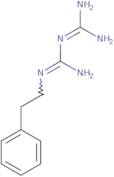Informations sur le produit
- (Phenylethyl)biguanide
- 1-(Diaminomethylidene)-2-(2-phenylethyl)guanidine
- 1-Carbamimidamido-N-(2-phenylethyl)methanimidamide
- 1-Phenethylbiguanide
- Biguanide, 1-phenethyl-
- Cronoformin
- DB Comb.
- DB-retard
- DBI
- Debeone
- Voir d'autres synonymes
- Diabis
- Dibiraf
- Dibotin
- Fenfoduron
- Fenformin
- Fenformina
- Fenormin
- Glukopostin
- Glyphen
- N-(2-Phenylethyl)imidodicarbonimidic diamide
- N-(β-Phenethyl)diguanide
- N-(β-phenethyl) biguanide
- Pedg
- Phenethylbiguanide
- Phenformine
- Phenformix
- Retardo
- W 32
- β-PEBG
- β-Phenethylbiguanide
- Imidodicarbonimidic diamide, N-(2-phenylethyl)-
Phenformin is a drug that belongs to the group of biguanides. It inhibits the activity of P-glycoprotein (P-gp), which is a transporter protein that pumps drugs out of cells, and thereby increases the concentration of metformin in tissues. Metformin has been shown to decrease hepatic glucose production and increase insulin sensitivity in liver and muscle tissues, leading to an improvement in blood glucose levels. The drug also has potential anticancer properties due to its ability to induce cellular transformation. Phenformin has been used for the treatment of type 2 diabetes mellitus as an oral hypoglycemic agent since 1957, although it was withdrawn from the market because it caused lactic acidosis at high doses. This drug may be useful as a biomarker for cancer detection because it accumulates in tumor cells and can be detected in urine samples.





